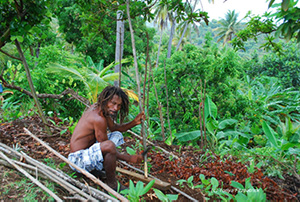Ancestry Travel: How Traveling Leads to Family Discoveries

Gracie Berry. Photo credit Shelby Wormley of We & Company
Posted August 16, 2024
When Allen Bartimioli planned a trip to his ancestors’ homeland, he never imagined he would find himself face-to-face with a cousin he didn’t know he had.
Like many Americans, the Arizona pastor and his wife, Ellen, had done some genealogical research and had taken a 23andMe DNA test. Allen’s showed Italian and Sicilian ancestry—no surprise, given the family stories. According to Bartimioli lore, Allen’s paternal grandfather returned to his roots in Italy after World War II.
Allen and Ellen had always dreamed of taking a “bucket list trip” to Italy —Allen’s chance to connect with the grandfather he’d never known. “I wasn’t looking for family,” he says. “My grandfather had died eight years before I was born in a country I’d never been to.”

Allen and Ellen in Italy. Photo credit Allen Bartimioli.
The Journey Begins
On a balmy summer afternoon in 2014, Allen and Ellen arrived at their Airbnb in Italy. Upon learning that the couple had roots in the area, their host offered to show them around, topping off his tour with a trip to the local gelato shop. After hearing the surname Bartimioli, the shop owner suggested they visit a nearby village, where several people by the same last name resided.
The next morning, Allen stood in front of a picturesque countryside manor. The gate was locked and the house empty, but the mailbox read Bartimioli.
Allen and Ellen could hardly contain their excitement. Their Airbnb host shared the enthusiasm. “He’s on a mission now,” Allen recalls. “He’s going to find my family. He’d going door to door.” Before long, their host rang the right doorbell. A woman emerged from an upper-floor balcony and said she was the granddaughter of Allen’s great-uncle—making her Allen’s second cousin. She and other local family members were thrilled to meet their American cousins.
The Bartimioles kept in contact with their Italian relatives and planned another trip to Italy. This time, Allen was prepared with a basic understanding of the Italian language, a skill he has since mastered. The couple was invited to stay in the homes of family members and even enjoyed a night at the countryside estate they had seen on their first visit.
Even better, some of their cousins made the trip to the United States and stayed in the Bartimioles’ Airbnb space for the holidays. “They didn’t know what happened to the American side, we didn’t know a thing about what happened to the Italian side. But there we were, in each other’s houses.”

Bartimioli cousins
Using Stories and Records to Discover Your Roots
The discovery of Allen’s long-lost Italian family was a stroke of good timing and better fortune. Still, it shows that there might be more waiting for you across the ocean than you expect.
Even if you don’t make contact with distant overseas relatives, planning a vacation around your heritage can be an amazing way to learn more about your roots and reveal a new facet of yourself.
So, how can you go about making your own overseas journey to the place of your family’s origin? A lot depends on where your roots lie. But for those of any ethnic background, the best place to begin ancestral research is with family. “Story is so important,” Allen advises. Gather narratives from older family members. They might remember quite a bit of family lore and may have even done some genealogical research.
Walk Backward Through Your Family History
Next, walk backward through the history of your family line. Gravesites, obituaries, baptism records, and marriage records leave a trail of clues to your past. Many of these things may have been uploaded to Ancestry.com.
Depending on when and where your family emigrated, you might be able to take a look at ships’ manifests to find countries of origin. Despite language barriers, it’s often possible to find additional birth and death records within the old country itself.
Hopefully, the stories and documents you gather will lead you to find your ancestors’ origins. Maybe you’ll even be lucky enough to discover relatives still residing in the area.
Take a DNA ancestry test
If you don’t have many genealogical records, aren’t in contact with family, or were adopted, a DNA ancestry test can reveal your roots. The information you receive won’t lead to specific locations, but it will allow you to learn the regions or countries of your family’s origins.
For those who do have plenty of family stories, taking a DNA ancestry test often affirms family lore—or corrects misinformation passed down. “We couldn’t have been any more spot-on,” Allen shares of his own experience with affirming his ethnic background. “While for some people: ‘Oh, I’m not even Italian. My grandparents just moved there from Yugoslavia.’”
Ancestry Research for People of Color
As ideal as the Bartimiolis family discovery story might be, many North Americans may find this approach unrealistic for themselves. There is far more data available for European ancestry than for those of other backgrounds.
Before starting your genealogy journey, research which DNA tests and record sources are most suitable for your ethnicity. Ports of entry other than Ellis Island may hold the key to your family’s past. Angel Island, for example, contains records for many Asian-American families. Utilizing family search websites or library record collections specializing in tracing ancestry to specific regions is also a good idea.
For those with African heritage, tracing family lineage can be especially difficult. Records often peter out at the 1870 census, which was the first to list the names of Black Americans. With some good fortune and digging, you may be able to find the names of pre-1870 ancestors using resources such as those listed on Family History Daily.
However, a simpler way to find your African ancestral homeland (and perhaps even tribe) is to take a DNA ancestry test such as African Ancestry.

Gracie Berry. Photo credit Shelbey Wormley of We & Company.
Following African Ancestry
Artist Gracie Berry, founder of Girlrilla Vintage Afrikan Roots & Empowerment Organization, did just that. “I always felt a strong bond with West Afrikan culture,” she shares. In addition to learning from books, dance, and friends in her neighborhood, she gained knowledge of traditional root medicine, which her mother’s line preserved and passed down after the Middle Passage. As an adult, Gracie’s heritage informed her artwork, which she describes as “inspired by the stories and themes of ancient Afrikan civilizations.”
Gracie’s ancestry test revealed a matrilineal line from the Mende people in Sierra Leone. “As I opened my African Ancestry results, thoughts of my mother’s lineage being forcibly removed from their homeland, never again to see it brought me to tears,” she says. “Discovering my Sierra Leonean Mende roots has really ignited my interest in touching down one day.”
Although Gracie’s original plans to travel to her ancestral homeland fell through due to the pandemic, she is determined to eventually set foot on the soil her ancestors left behind so many years ago. “My heritage influences not just who I am, but also how I express myself creatively and connect with my ancestors, solidifying my bond to the continent.”
Planning Your Ancestry Travel
Once you’ve determined where your ancestors lived, you can plan a trip to visit some of those locations. Allen, an avid globetrotter and travel agent, enjoyed crafting a vacation around the locations his family history indicated. However, for those who don’t relish the planning stage, it is possible to hire an agent to research the region and build a trip with your family’s ancestral hometown as the hub.
Upon arrival, one major obstacle is breaking the language barrier. You may be able to get someone from your hotel or Airbnb to give you advice before you set off each day. “We did look for an Airbnb with an English speaker,” Ellen puts in.
Whatever your family history looks like, modern technology has made it possible for you to discover your roots and travel to your ancestral homeland. A trip like this can connect you to your cultural heritage—and a deeper part of yourself.
“Discovering my West Afrikan roots completely changed how I see myself and my place in the world,” Gracie shares. “It’s been a magical thing,” Allen says of his journey. “It expanded my depth of who I am and where I’m from.”
Click Here for Discounted Accommodations in Italy.
Join the community!

Join our community to receive special updates (we keep your private info locked.)




